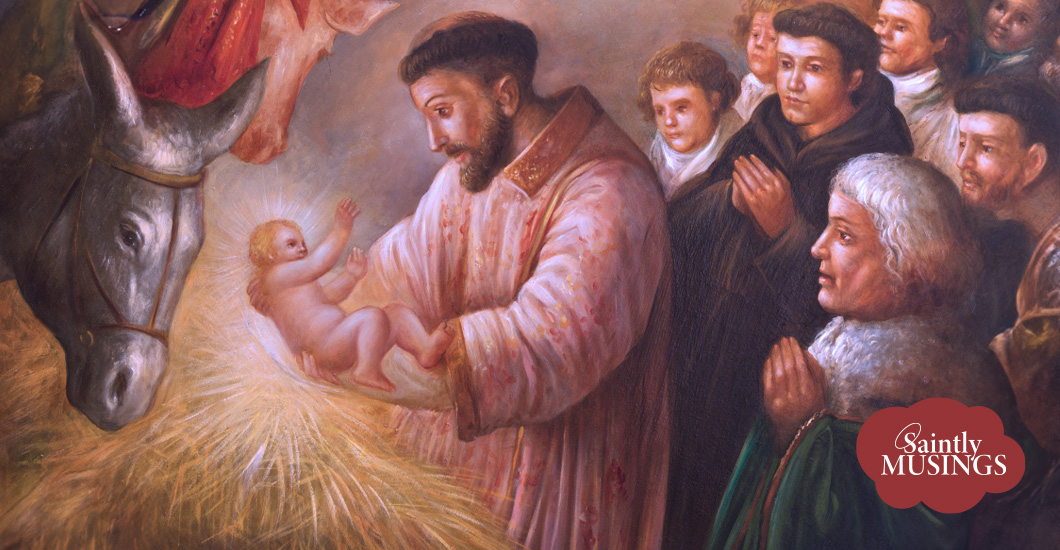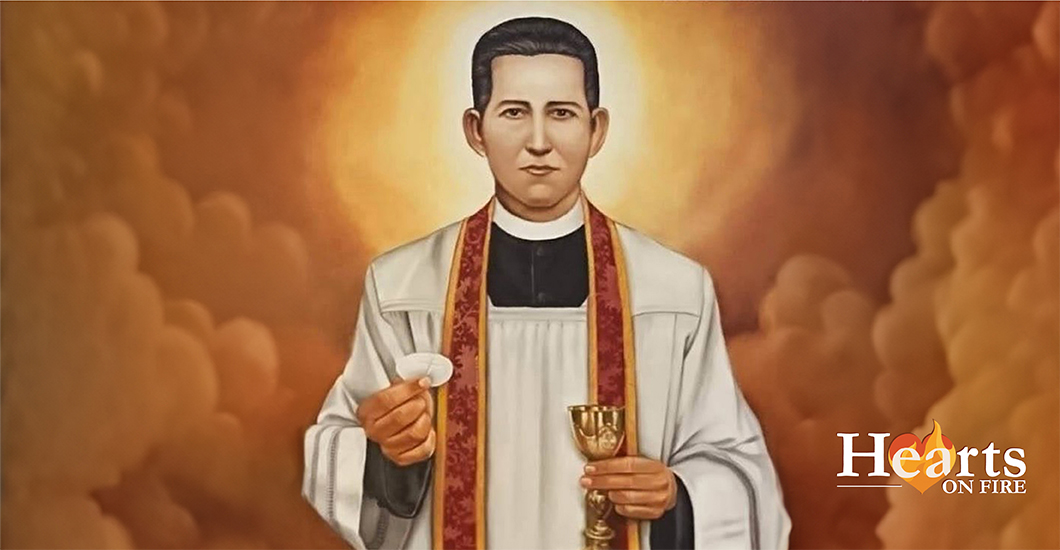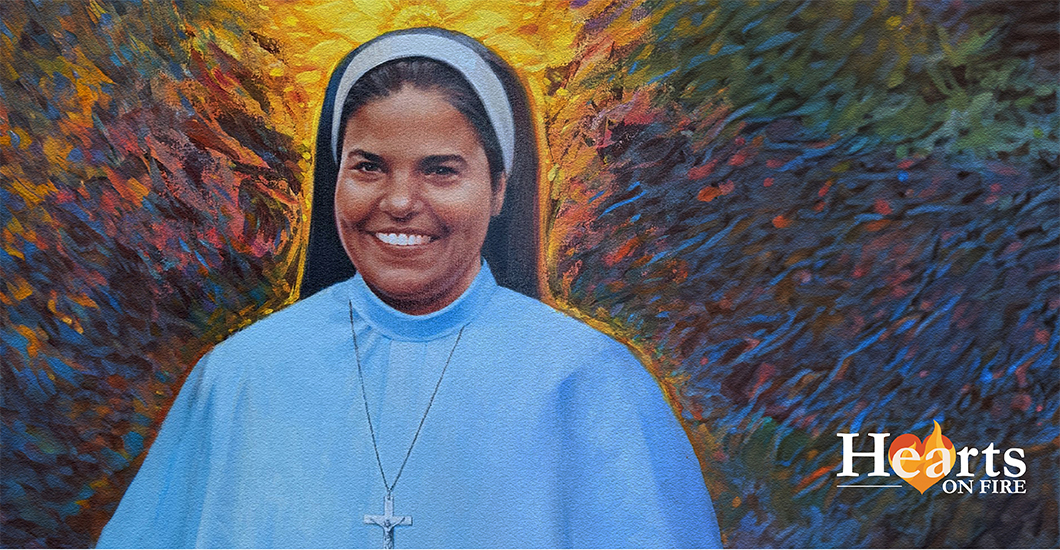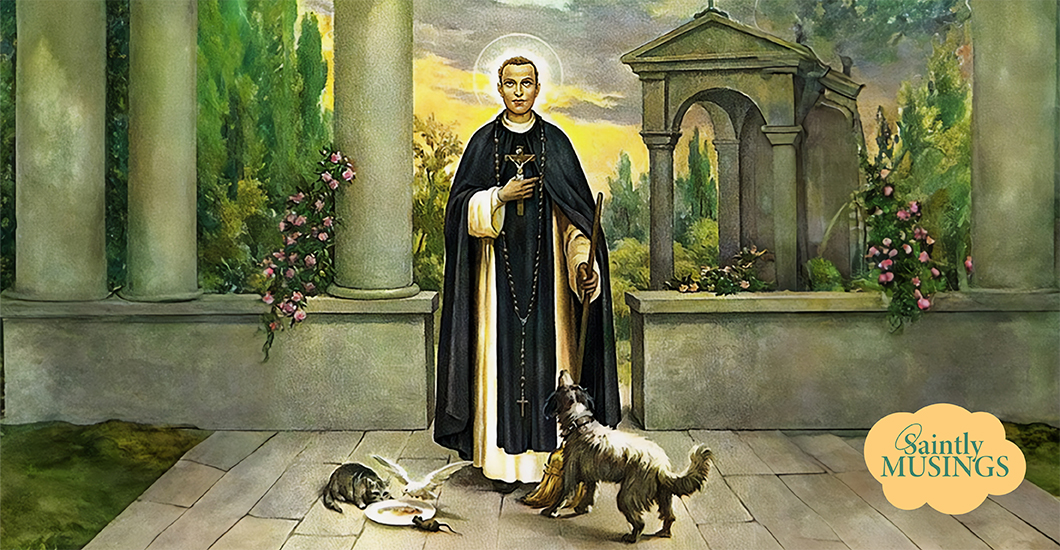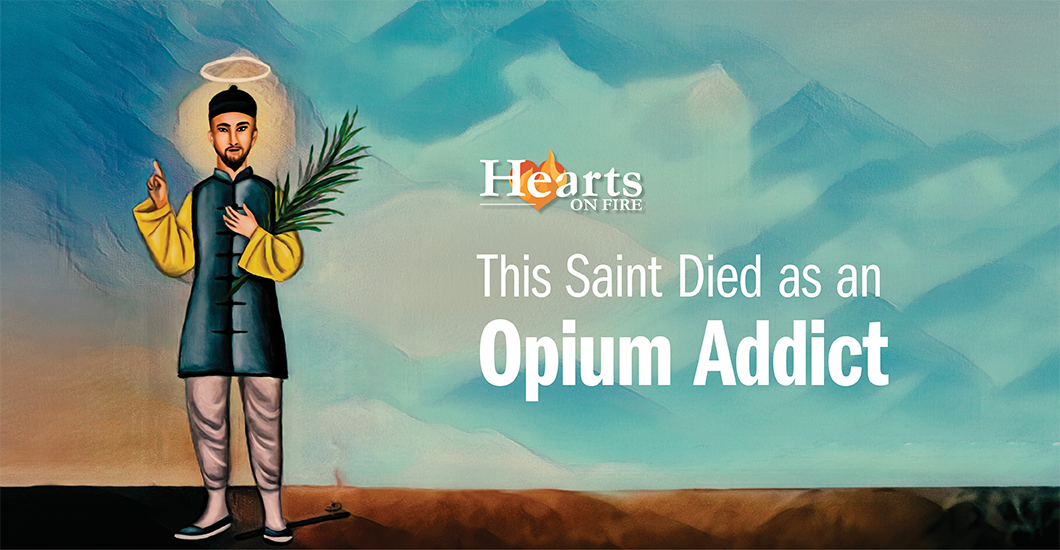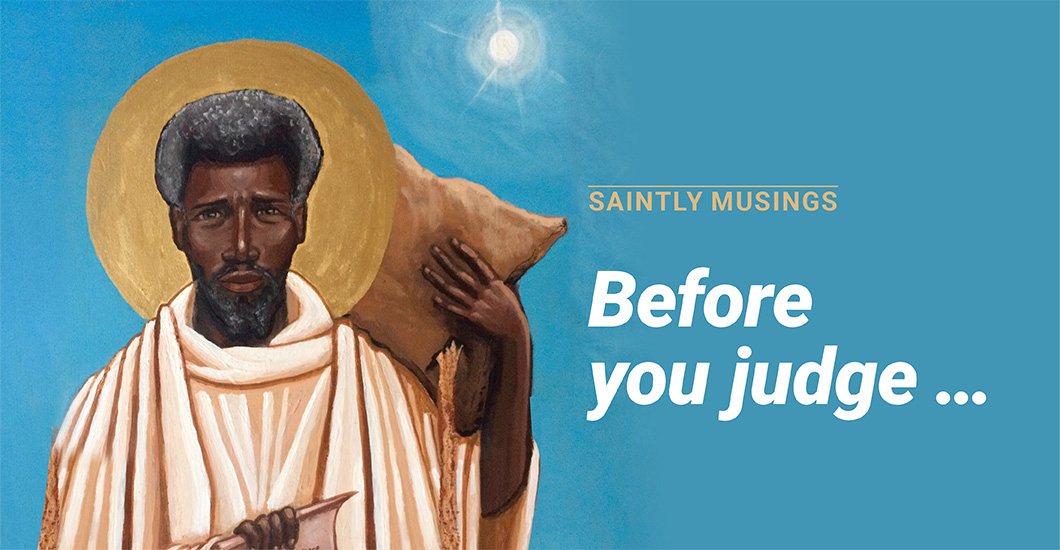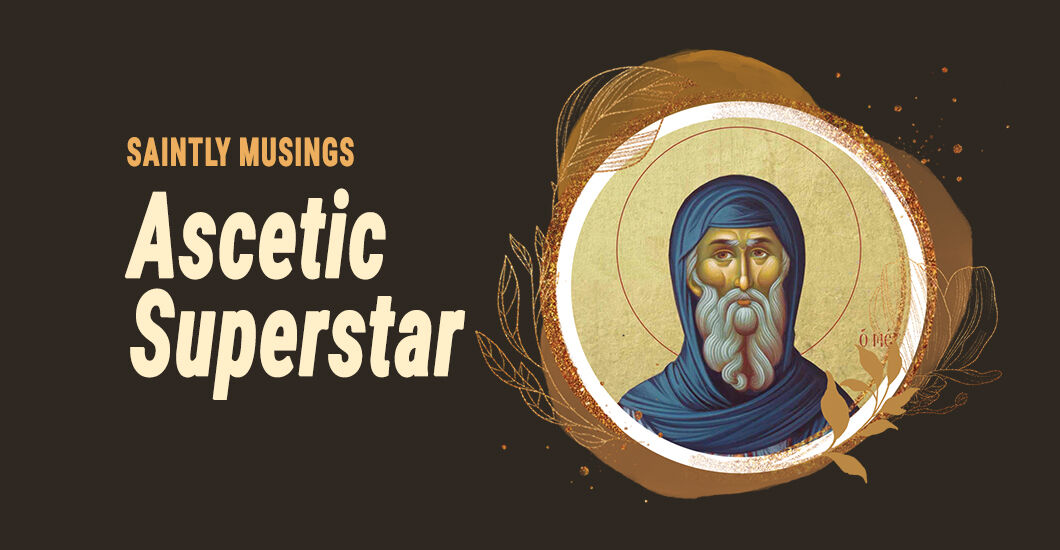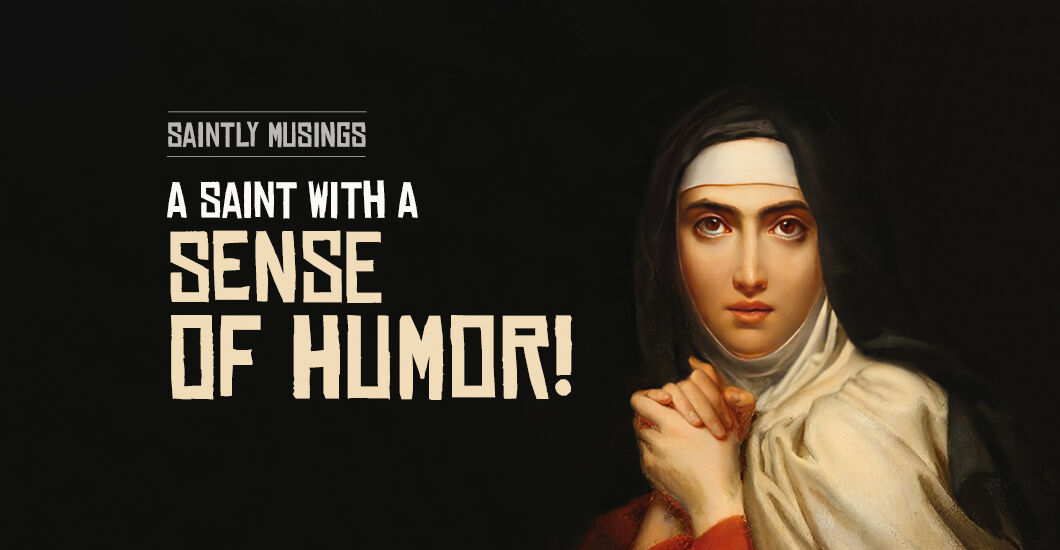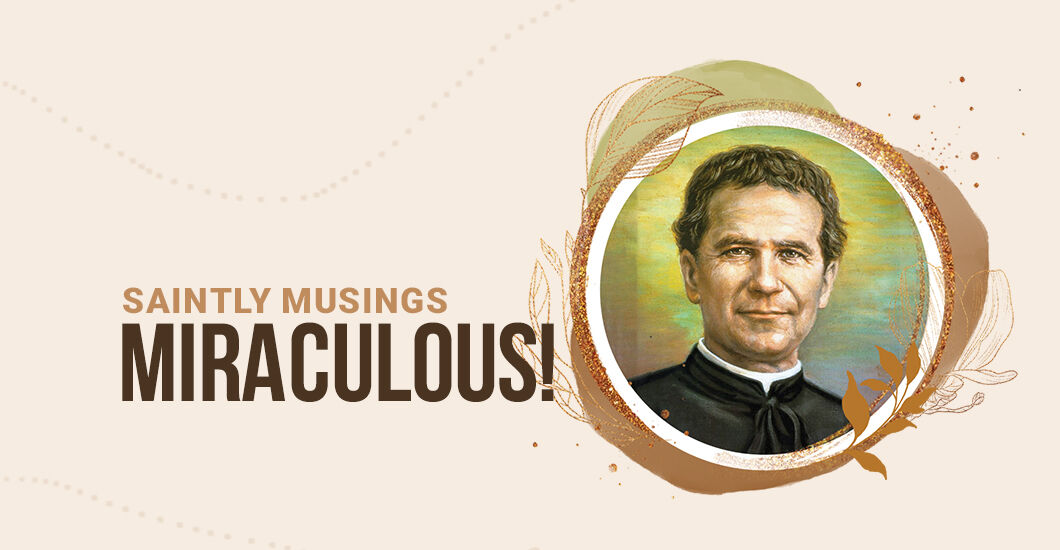Trending Articles
Hospitality for a Thirsty Rose
A pillar of Benedictine spirituality is hospitality. According to the Rule of Saint Benedict, everyone, without exception, is to be received as Christ. As a novice oblate of Saint Benedict about to make my final oblation, I was convicted of breaking this iron-clad rule by two strangers on the night of December 12, 2013, the Feast of Our Lady of Guadalupe. After praying the evening office, I had just settled down to meditate when the doorbell sounded a clarion call I felt compelled to answer. Peering through the peephole, I recognized the face of a fellow Legion of Mary member whom I was planning to see later that evening at our weekly meeting. Brother Jack lived miles from my neighborhood in the opposite direction—alarmed, I opened the door.
Instead of Jack, there stood a tall 30-something man with remarkably similar features but much longer, wavy brown hair reaching to his shoulders. In spite of the frigid weather, he was wearing only a long-sleeved black crewneck shirt and a striking gold cross that caught the porch light. His arms were at his sides, as if standing at attention, and his hands were empty. He smiled expectantly, his warm brown eyes silently regarding me through the glass of the unlocked storm door that still separated us, apparently waiting for me to open it and invite him in. I was too dumbstruck to speak—all I could do was smile back and, with flailing arms, motion him apologetically away. Instead of going away, his smile widened and, mimicking my gestures, he said, “What’s this? Signing? I can do that.” Feeling foolish, I shook my head and slowly shut the door. As it closed, he said reproachfully, “Thanks for your hospitality!” Ouch. I may as well have slammed the door in his face.
Where were my manners? What was I afraid of? Being taken away from something on my agenda or being asked to do something I did not want to do? Ashamed, I opened the door to call him back, but it was too late—the stranger had already vanished into the night, leaving no calling card or flyer in sight. I attempted to resume meditating, but my rhythm was off and my mantra, “Come, Lord Jesus,” rang hollow. Instead, I decided to visit the adoration chapel before my meeting, instead.
Contrite in His Holy Presence, I read, then re-read, Mother Teresa’s “I Thirst” meditation that someone had handed me earlier at Mass. Though I thirsted for Jesus, did Jesus really thirst for a sinner like me? Stretching out my arms toward the monstrance, I whispered: “Come, Lord Jesus, come back to me,” but it was already time to leave for my meeting. As I made a quick stop to my car, a middle-aged man bearing a bouquet of roses approached with a question in Spanish. Smiling apologetically, I explained that I did not speak Spanish—a convenient excuse for avoiding conversation. Then he asked in perfect English if I knew where he could get water for the flowers. Caught off guard, I shook my head and repeated my excuse—now an inexcusable brush off. As I turned away, he said reproachfully, “I speak all languages.” Nailed again! I wanted to turn around and ask for another chance, but I knew this was my other chance and I had blown it, big time. Ashamed, I fled to my meeting.
Why had I not been helpful? Why had I not suggested the restrooms in the building where I was headed? Of what was I afraid? Being late for a meeting I knew could easily start without me? Being judged unfavorably for tardiness? Though I arrived on time, a goal I had been working on recently, self-congratulations, seemed cheap, won at the expense of fragile flowers, obviously meant to honor Our Lady on her feast day. As I pondered both encounters on the way home, all my petty sins became magnified in the harsh light of my selfish neglect of those flowers. Did Jesus really thirst for a sinner like me? Parked in my driveway, I wept at the hardness of my heart. Upon entering my house, my spirits were lifted by the surprise of Christmas lights my daughter had strung in the foyer. A little flower had been added to a vase which, only hours ago, had contained a few sprigs of red berries. On closer inspection, it was a rose—a spotless red rose with a stunning head of velvety petals! My daughter confessed that a mysterious woman had dropped it at the metro station; before my daughter could return it, the lady had vanished into the rush-hour crowd. I said no worries. The tiny rose, an advent symbol of the baby Jesus—sprung from the root of Jesse through the stem of Mary—welcomed her hospitality, while I welcomed another chance to offer mine.
Over the next few weeks, I cared for the thirsty rose, replenishing its vase frequently, enjoying its sweetness and beauty. I also became a better servant of the moment, stepping up in an emergency to lead the next Legion of Mary meeting, offering a parishioner a ride home from Mass in an unexpected snowstorm and wishing a telemarketer a blessed evening, despite my interrupted prayer time.
On Epiphany Sunday, the day of my final oblation, the rose was still lovely, remarkably preserved after 24 days. Though still unworthy of the promise to dedicate myself to the service of God and others according to the Rule of Saint Benedict, I was ready to make it, renewed through my belief in the “Rose E’re Blooming’s” infinite thirst for a sinner like me.

Donna Marie Klein is a freelance writer. She is an oblate of St. Benedict (St. Anselm’s Abbey, Washington, D.C.).
Related Articles
The Mexican Revolution which began in the early 1920s, led to the persecution of the Catholic community in that country. Pedro de Jesus Maldonado-Lucero was a seminarian at that time. Once he became a priest, despite the risk, he stood with his people. He tended to his flock during a terrible epidemic, founded new apostolic groups, reestablished associations, and ignited Eucharistic piety among his parishioners. Upon discovering his pastoral activities, the government deported him, but he managed to return and continue serving his flock, in hiding. One day, after hearing the confessions of the faithful, a gang of armed men busted his hiding place. Father Maldonado managed to grab a reliquary with Consecrated Hosts as they forced him out. The men forced him to walk barefoot throughout the town, as a crowd of the faithful followed him. The city mayor grabbed Father Maldonado's hair and dragged him toward the city hall. He was knocked to the ground, resulting in a skull fracture that popped out his left eye. He had managed to keep his grip on the pyx until this time, but now it fell out of his hands. One of the thugs took some Holy Hosts, and as he forcefully stuffed the hosts inside the priest’s mouth, he shouted: “Eat this and see if He can save you now.” Little did the soldier know that just the night before, during the Holy Hour, Father Maldonado had prayed that he would happily give his life for an end to the persecution ‘if only he would be allowed to take Communion before his death.’ The thugs left him for dead in a pool of his own blood. Some local women found him still breathing and rushed him to a nearby hospital. Father Pedro Maldonado was born into eternal life the next day, on the 19th anniversary of his priestly ordination. Pope John Paul II canonized this Mexican priest in 2000.
By: Shalom Tidings
MoreRani Maria Vattalil was born on 29 January 1954 to Eleeswa and Paily Vattalil in a small village called Pulluvazhy, in Kerala, India. From a young age, she was brought up in the Christian faith, having love for the poor. She attended daily Mass and led family prayers. During the final year of high school, Rani felt the Lord calling her to consecrated life and entered the Franciscan Clarist Congregation in 1972. It was Rani Maria’s ardent desire to do missionary work in North India and serve the poor, even if it cost her life. She was sent to Madhya Pradesh (a central Indian state) and served several mission areas there. Sister Rani Maria was given the responsibility of coordinating the social apostolate of the local diocese. She organized various educational programs for children and young people and worked relentlessly to empower the indigenous people. She understood how the poor, illiterate farmers were exploited and taken advantage of by their landlords. So, she educated them on their rights, helped them fight for justice, and spoke for those who were unjustly imprisoned. All this infuriated the upperclass landlords, who threatened her with dire consequences if she continued supporting the cause of the poor. But Rani Maria feared nothing and did not back down from her mission to 'love her neighbor.' A devious plan was then hatched by those who hated her. On 25th February 1995, while traveling by bus, she was mercilessly stabbed 54 times by Samundhar Singh—a man hired by the landlords. She breathed her last, repeating the Holy name of Jesus. Rani Maria worked her entire life to fight for the dignity and rights of her fellow men and bore witness to the Gospel through her social activities. Sister Rani Maria’s family, following the valiant example of their daughter, forgave her murderer wholeheartedly, even inviting him to their home! This act of mercy touched him deeply; he repented of his heinous crime and became a changed man. Sister Rani Maria was beatified by Pope Francis on 4th November 2017.
By: Shalom Tidings
MoreMartin de Porres was born in 16th-century Peru; he grew up facing the stigmas of both his mixed race and illegitimacy. After a barber-medical apprenticeship in his young years, he joined the Dominicans as a ‘lay helper’ and continued his barber work in the monastery. One day, Brother Francis Velasco Carabantes approached Martin, desiring to talk to this man whom people were already starting to believe was saintly. Martin was busy with his barber work; he absent-mindedly grabbed this novice and placed him in the barber’s chair. Brother Francis had no inclination to have his head shaved; he disliked the hairstyle that the Dominicans used. Before he could resist, Martin had finished his job, and Brother Francis was angry beyond expression. He started to shout, calling Martin all sorts of curse words. Martin was lost in prayer, and by the time he noticed that this novice was shouting, one of the rectors had seen the commotion and was scolding Brother Francis, who was severely punished and sent away. Martin, once he came to realize what had happened, went to the rector with all possible excuses. He begged forgiveness for this person who had verbally abused him, trying even to explain away the curse words used. Finally, he told the rector: “Everyone knows what a sinner I am.” The rector, who was aware of Martin’s saintly life, gave in to his request and forgave Brother Francis. Not satisfied with this, Brother Martin even sent fresh fruit, which was a rare delicacy in the monastery, to Brother Francis. How many times have we rejoiced in the ‘just’ punishments that our transgressors received? Let us pray to Saint Martin for the virtue of humility, to forgive and show the other cheek, as Jesus taught us to do.
By: Shalom Tidings
MoreOn a scorching afternoon on the streets of Calcutta, I met a boy… Prayer is an undeniable, central, and key part of every Christian’s life. However, Jesus emphasized two more things which clearly went hand in hand with prayer—fasting and almsgiving (Matthew 6:1-21). During the seasons of Lent and Advent, we are specifically called to commit more time and effort to all three ascetic practices. ‘More’ is the important word. Whatever season we are in, radical self-denial and giving are a continuous call for each baptized believer. Around eight years ago, God literally made me stop and think about it. Unexpected Meeting In 2015, I had the great privilege and blessing of fulfilling a lifelong dream to be with and serve some of the most in-need brothers and sisters worldwide in Calcutta, India, where the poor are described not only as poor but the ‘poorest of the poor.’ From the moment I landed, it was as though electricity was running through my veins. I felt such immense gratitude and love in my heart to be given this amazing opportunity to serve God with Saint Mother Teresa’s religious order, the Missionaries of Charity. The days were long but absolutely action-packed and grace-filled. Whilst I was there, I did not intend to waste a moment. After a 5 AM start to each day with an hour of prayer, followed by Holy Mass and breakfast, we set off to serve at a home for the sick, destitute, and dying adults. During the break at lunchtime, after a light meal, many of the religious brothers I was staying with took a siesta to recharge their batteries, to be ready to go again in the afternoon and on into the evening. One day, instead of having a rest in the house, I decided to go for a walk to find a local internet café, to contact my family by email. As I turned one of the corners, I encountered a young boy aged around seven or eight years old. His face expressed a mixture of frustration, anger, sadness, hurt, and tiredness. Life had already seemed to have begun to take its toll on him. He was carrying over his shoulder the biggest transparent, heavy-duty plastic bag that I had seen in my life. It contained plastic bottles and other plastic items, and it was full. My heart broke within me as we stood silently examining one another. My thoughts then went to what I could give this young boy. My heart sank, as I reached for my pocket, realizing that I only had a small amount of change with me to use for the internet. It added up to less than one pound in English money. As I gave it to him, looking him in the eye, his whole being seemed to change. He was so lifted and grateful, as his beautiful smile lit up his beautiful face. We shook hands, and he walked on. As I remained standing in that back street of Calcutta, I stood in awe as I knew that the Almighty God had just personally taught me such a powerful life-changing lesson through this encounter. Reaping Blessings I felt God had beautifully taught me in that moment that it is not the actual gift that is important but the disposition, intention, and love from the heart with which a gift is given. Saint Mother Teresa beautifully summed this up saying, “We cannot all do great things, but we can do small things with great love.” Indeed, Saint Paul said, if we give away all we have “but have not love,” we gain nothing (1 Corinthians 13:3). Jesus describes the beauty of giving, that when we “give… it will be given to you; good measure, pressed down, shaken together, running over, will be put into your lap. For the measure you give will be the measure you get back.” (Luke 6:38). Saint Paul also reminds us that “Whatever a man sows, that he will also reap” (Gal 6:7). We do not give in order to receive, but God in His infinite wisdom and goodness blesses us personally in this life and also in the next when we step out in love (John 4:34-38). As Jesus taught us, “it is more blessed to give than to receive” (Acts 20:35).
By: Sean Booth
MoreThe Chinese Boxer Rebellion in the 1900s killed nearly 32,000 Chinese Christians and 200 Western Missionaries. Among these devoted Christians who gave their life for their faith, Saint Mark Ji Tianxiang stands out because, at the time of his death, he was an opium addict who had not received the Sacraments for 30 long years. Ji was raised in a devout Christian family, and he was a respected and charitable doctor in his community. Fate be blamed, the opium he took to abate a disturbing stomach ailment took hold over him, and he was addicted to it in no time. Though he went to frequent Confession, Ji found himself in the grips of a powerful addiction that refused to succumb to any means of resistance. His parish priest and confessor eventually told him that he could not continue to repeat the same sin in Confession anymore. Confession requires a conscious resolve to repent and sin no more, and this repeated sin, in the 19th century, was not understood as an illness. He was henceforth restricted from receiving the Sacraments, but he continued visiting the Church and stayed true to the Lord’s ways. He remained sincere to his faith because He believed in a Merciful Father. Many assumed that he would be the first to deny the Lord when faced with the threat of persecution. But along with his son, grandchildren, and daughters-in-law, he persevered till the very end. In fact, Ji provided spiritual consolation to his fellow Christians as they were imprisoned and awaiting execution. Stories record that as they were dragged to prison, his grandson, shaking with fear, asked him, “Grandpa, where are we going?” He calmly and jubilantly answered: “We’re going home.” He went to his death, singing the Litany of the Blessed Virgin Mary. Pope John Paul II canonized him in the year 2000.
By: Shalom Tidings
MoreEver heard of a robber who turned into a Saint? Moses the Black was a leader of a band of thieves who attacked, robbed, and murdered travelers in the Egyptian desert. The very mention of his name spread terror in people’s hearts. On one occasion, Moses had to hide in a monastery and was so amazed at the way he was treated by the Monks that he converted and became a monk! But the story doesn’t end there. Once, four of the robbers of his former band descended upon the cell of Moses. He had lost none of his great physical strength, so he tied them all up. Throwing them over his shoulder, he brought them to the monastery, where he asked the Elders what to do with them. The Elders ordered that they be set free. The robbers, learning that they had chanced upon their former ringleader and that he had dealt kindly with them, followed his example: they repented and became monks. Later, when the rest of the band of robbers heard about the repentance of Moses, they also gave up their thievery and became fervent monks. After many years of monastic struggles, Moses was ordained deacon. For another fifteen years, he continued his monastic labors. About 75 disciples gathered around the saintly Elder, who had been granted the gifts of wisdom, foresight, and power over demons by the Lord. Once, a certain brother committed an offense in Scete, the camp of the monks. When a congregation was assembled to decide on this matter, they sent for Abba Moses, but he refused to come. Then they sent the priest of the church to him, imploring, “Come, for all the people are expecting you,” and finally, he responded to their pleas. Taking a basket with a hole in it, he filled it with sand and carried it upon his shoulders. Those who went out to meet him asked, “What does this mean, O Father?” And he replied, “The sands are my sins, which are running down behind me, and I cannot see them. Yet, I have come here today to judge shortcomings that are not mine.” When they heard this, they set that brother free and said nothing further to him.
By: Shalom Tidings
MoreAt the age of 20, Anthony lost his parents and was left with a large inheritance and the responsibility of caring for his sister. About the same time, Anthony happened to hear a reading from the Gospel of Matthew, where Jesus tells a rich young man, "If you want to be perfect, go and sell everything you have and give the money to the poor." Anthony believed he was that rich young man. Shortly after, he gave away most of his property, sold almost everything else, and kept only what he needed to care for himself and his sister. But that’s not exactly what the Lord had commanded! Not long afterward, Anthony was at Mass once again and heard the Gospel passage, “Do not worry about tomorrow; tomorrow will take care of itself” (Matthew 6:34). Again, he knew Jesus was speaking directly to him, so he gave away even the little he had saved, entrusted his sister to the care of some holy women, and entered the desert to live a life of poverty, solitude, prayer, and mortification. In that harsh desert landscape, the devil attacked him in countless ways saying “Think about all the good you could have done with that money you gave away!” Firm in prayer and mortification, Anthony fought off the devil and his manifestations. Many were attracted to his wisdom, and these he encouraged to seek self-denial and the hermetic life. No wonder after his death he became Saint Anthony the Great or Saint Anthony of the Desert, the father of Christian Monasticism. Once a brother renounced the world and gave his goods to the poor, but he kept back a little for his personal expenses. He went to see Abba Antony. When he told him this, the old man said to him, "If you want to be a monk, go into the village, buy some meat, cover your naked body with it and come here like that." The brother did so, and the dogs and birds tore at his flesh. When he came back the old man asked him whether he had followed his advice. He showed him his wounded body, and Saint Antony said, "Those who renounce the world but want to keep something for themselves are torn in this way by the demons who make war on them."
By: Shalom Tidings
MoreFew Saints of the Catholic Church have captured the popular imagination like Joan of Arc. Her story is depicted in paintings, sculptures, and numerous films. Born into a peasant family in 1412, Joan grew up illiterate, but acquired a profound love for the Church and a deep faith in God from her mother. Because she loved prayer and the sacraments, her neighbors said, “She was so good that all the village loved her.” She cared for the sick and homeless, often even giving them her own bed. By the age of thirteen, Joan began to hear the voices of Michael the Archangel, Saint Margaret of Antioch, and Saint Catherine of Alexandria. They told her she was to liberate France and ensure the French heir to the throne was installed as France’s rightful king. She won his trust by telling him details of his past only someone with divine knowledge could know. At the time, France was dominated and ruled by England. Convinced that her “voices” came from God, Joan heroically and faithfully obeyed their instruction, despite obstacles and suffering. Prayer and contemplation remained primary in her life even as she led battles, during which she never raised the sword against an enemy Though two years earlier a commission had “declared her to be of irreproachable life, a good Christian, possessed of the virtues of humility, honesty and simplicity”, Joan was accused of witchcraft and heresy after the English captured her, receiving no support from the very King she put on the throne. At her trial, Joan manifested her deep faith and wisdom, and despite being wrongly condemned, she never lost her faith in God or the Church. When she was burned at the stake, she proclaimed the name of Jesus while holding a crucifix to her heart, causing an observer to say, “We have burned a saint.” Her death increased her fame and popularity. Twenty years later, a new trial declared her innocent of all her alleged crimes. After her reputation grew over the centuries to epic proportions, Joan was beatified in 1910 by Pope Pius X and canonized eleven years later by Pope Benedict XV. She is now the patron Saint of France and one of the Church’s most beloved Saints. Joan’s obedience to God ensured France kept the Catholic faith during the Protestant Reformation while England abandoned it. France remained a solid center of Catholicism from which it would spread to northern Europe.
By: Shalom Tidings
MoreThe river had swelled so high that water covered everything and all sense of where the road or footpath might be was purely a guess. With water everywhere, it seemed foolish to advance, especially in a carriage, for if anyone strayed ever so little off the road, they would perish without a doubt. As her companions panicked, Sister Teresa encouraged them, “As we are engaged in God’s work, how could we die in a better cause?” She then led the way on foot to the convent through the fierce storm. Suddenly she slipped down an embankment and fell squarely into the mud. Instead of complaining or cursing, the irrepressible nun, looked to the sky and quipped, “If this is how you treat your friends, no wonder you don’t have many!” The sixteenth-century Saint and Doctor of the Church, Teresa of Avila, didn’t take herself or this world too seriously and brushed off the little hardships of life with a sense of humor. Her ability to humbly recognize her own faults and need for grace was also tinged with her refreshing humor. In her autobiography, Teresa writes, “Having virtuous and God-fearing parents would have been enough for me to be good if I were not so wicked.” Saint Teresa was also mindful of false piety and once said, “From silly devotions and sour-faced saints, good Lord, deliver us!” A healthy and good sense of humor will keep our head straight and enable us to see the world’s true beauty. Did God say that we need to be “sour-faced” to be holy? So, if you want to become a saint, lighten up, share the joy of the Lord and laugh with your friends like Jesus did.
By: Shalom Tidings
MoreMaria Stardero, a 12-year-old girl, was led by her aunt into the church where dozens of boys were standing about or kneeling in prayer as they waited for Don Bosco to arrive for confessions. As she made her way to a pew, some of the boys noticed that the young girl’s eyes had no corneas and resembled white marbles. When Don Bosco arrived, he asked the girl about her condition. She had not been born blind, she told him, but because of eye disease she had completely lost her sight two years earlier. When he inquired about medical treatment, her aunt began to sob. They had tried everything, but doctors had only one thing to say: “It is incurable!” “Can you tell whether things are big or small?” Don Bosco asked the child. “I can’t see anything.” He led her to a window to see if she could perceive light, but she couldn’t. “Would you like to see?” Don Bosco asked. “Oh, yes! It’s the only thing I want,” said the girl, breaking down in tears. “Will you use your eyes for the good of your soul and not to offend God?” “I promise I will, with all my heart!” “Good,” said Don Bosco. “You will regain your sight.” After recourse to Mary, Help of Christians, Don Bosco recited the Hail Mary and blessed the girl. Then holding a medal of Mary Help of Christians before the girl’s eyes he asked, “For the glory of God and the Blessed Virgin, tell me what I’m holding in my hand.” “She can’t . . .” the elderly aunt began, but Don Bosco paid no heed. After a few seconds, the child shouted, “I see!” Immediately she described the medal in great detail. But when she stretched out her hand to receive it, it rolled into a dark corner. The aunt moved to retrieve it, but Don Bosco motioned her back. “Let her find it to see if the Blessed Virgin has thoroughly restored her sight,” he insisted. Immediately, the girl walked to the dark corner and bent down to retrieve the tiny object. As the many witnesses looked on, awed and profoundly moved, Maria, thanked Don Bosco profusely and with sobs of great joy. Entrust everything to Jesus in the Blessed Sacrament and to Mary, Help of Christians and you will see what miracles are! Saint John Bosco
By: Shalom Tidings
MoreLatest Articles
My dog enjoys going for walks, but he wants to be in control. He doesn’t pay attention to my cues. He doesn’t care where I want to go; instead, he goes wherever he wants to. I keep him on a short leash because he tends to chase after cars. If I allowed him to do whatever he wanted, he would get hurt. My dog is stubborn. He pulls and tugs with all his strength. He doesn’t understand that I am only trying to protect him. I wonder if I am as unyielding as my dog. The Lord guides me along the best pathway for my life. He advises and watches over me. Yet, sometimes, I am like a senseless animal that needs a bit and bridle to be kept in check. I feel I know what is best for me. I don’t want to wait for God’s timing. I want to chase my desires and follow my impulses. I am reluctant to stay calmly by God’s side and seek His will in all things. Lord, train me to yield to You. Teach me to trust that You know what is best although it may not be what I want. Help me want to please You more than anything else. May I enjoy walking by Your side faithfully and attentively as You lead me along the best pathway for my life.
By: Nisha Peters
MoreAdulthood is scary, but with the right company, you can learn to thrive in grace and strength! Jesus treasured friendship and hand-picked 12 men to walk closely with Him and learn from Him. Of course, there were also women friends. Remember the sisters, Mary and Martha? And Mary Magdalene? The fact that the Gospels mention these friendships reveals that the people in the fabric of our lives are very important. Jesus even called His disciples friends! “I no longer call you servants, because a servant does not know his master’s business. Instead, I have called you friends, for everything that I learned from my Father I have made known to you.” (John 15:15) It is an honor and elevation to be called a friend of His! In the same way, it’s important for us to recognize that being a friend to one another is an honor. It is a role to be taken seriously. As Jesus reminds us: “Whatever you did for one of the least of these brothers and sisters of mine, you did for me.”(Matthew 25:40) Your presence, or lack of it, is impactful to another. Your actions, support, and prayers can make an immense imprint on the life of another person. It is a role to steward well, as with any of the roles we have been entrusted. A Gift Par Excellence In adulthood, many lament at the lack of friendship or the difficulty of making friends. The ache of a heart longing for dear friends is very real. Friendship is truly a gift, a gift that one should most definitely pray for. The impact of true Christian friendship on a person’s life is very deep. So it is important to carefully ‘choose’ the people with whom you entrust this title. A friend who does not share the same values can be closer to an enemy. Proverbs 27:17 reminds us: “As iron sharpens iron, so one person sharpens another.” The lives of the Saints are a constant encouragement as we often hear about one Saint being friends with another! Saint Francis and Saint Clare are often talked about as friends who partnered in purpose and spirituality, enriching one another's lives. So were Saint Teresa of Avila and Saint John of the Cross. Saint John Paul II and Mother Teresa are 20th-century models. True friends will spur us on to become the best versions of ourselves. Led by Faith I attribute much of my growth and life successes to being surrounded by the right friends. The people closest to me have a clear spiritual vision. They have provided encouragement right on time, and I know that they are always available for prayer support, whether that be interceding for me in their own time or dropping everything to pray with me. A Christ-focused friend will often know when you need prayers. I have a friend who can sense the area of my life that I need prayers for. She often shares what the Holy Spirit has told her in prayer. Conversations with her are always encouraging and they provide me with strength and confirmation. I can recall numerous times when a friend sent a Scripture verse right on time or a word from the Holy Spirit that resonated perfectly with me. On too many occasions to count, I’ve had a text message from a friend letting me know that they felt led to pray for me. These mostly come when I am in the midst of making very large life decisions or facing some huge internal struggle. There was a time when I felt very stuck in life; it seemed that I was making no progress. A dear friend sent me a Word that they believed God was doing something very special behind the scenes in my life. I felt the strength to go on and realized that God was up to something, even though I was feeling discouraged. Days after that, things started clicking into place–desires that I had prayed for over many years began to manifest in my life! A true friend will be willing to intercede with and for you as you fight your battles. They will celebrate the victories of God in your life and be concerned for your spiritual welfare more than any other aspects of your life. But remember, there are also times when you will need to let a friend know that you are in need of prayers. I know that my life would look very different if it were not for my friends who are in tune with the Holy Spirit. Walking with others on the same journey of surrendering to Christ has had clear benefits. A shared vision of aiming for Eternal life and holiness in this life is valuable in friendship. I’ve had the honor of being helped and helping friends carry their crosses in life, sharing joys, and praising God together. Enrich Your Life Are you in a period of life where you are longing for more friends? Pray to meet them! Keep your eyes open for the unexpected ways they come into your life. If you’re in a season of life where you have friends, but feel distant, start by sending a message or calling a friend who has been in your thoughts lately. Open your heart to friendship. Too many friendships have withered and never had a chance to fully blossom due to the busyness of one or both parties. Friendship, like any other relationship, requires sacrifices. It will look different in different seasons. Yet, it is a tremendous blessing and gift from God. Building and maintaining friendships is an investment. Enduring friendships can add so much enrichment and value to your life. Cherish the gift of a good friend, and treasure greatly the title of a friend when it is bestowed upon you. Jesus, please help us to be true and faithful friends to others. Send us the friends with whom we can walk steadily toward You. Amen!
By: Lianna Mueller
MoreChristmas is not just a day but a season of celebrating joy and hope. Hanging lights, stars, and Christmas trees make the occasion colorful, but it is undoubtedly incomplete without a nativity scene. Have you ever wondered how the tradition of staging the nativity scene began? Greccio, a small town in Italy, was home to peasants who led a peaceful agricultural life. More than 800 years ago, Brother Francis, returning from a pilgrimage to the Holy Land, obtained permission from Pope Honorius III to re-enact the birth of Jesus, the scene of which he had just visited. So on Christmas Eve of 1223, inside a cave in Greccio, villagers disguised as Saint Joseph and Mother Mary acted out the historical event that only Bethlehem had seen. Francis welcomed more life to the holy night act with a rag doll representing the Christ Child; he even brought an ox and a donkey, giving the villagers a visual treat. He then stood before the manger, full of devotion and piety, his face bathed in tears and radiant with joy; the Holy Gospel was chanted, and he preached about the nativity of the poor King. Unable to even utter His name for the tenderness of His love, Francis called Him the Babe of Bethlehem. Master John of Greccio, a valiant soldier and a dear friend of Brother Francis, who, for the love of Christ, had left the worldly affairs, witnessed Francis cradling a beautiful infant in his arms so gently as if he feared the baby might wake up. Doubtless, the baby was the Christ Child Himself because a trail of miracles followed the scene. It is said that the hay of that manger, being preserved by the people, miraculously cured the cattle of many diseases and other pestilences! Brother Francis turned out to be none other than Saint Francis of Assisi, one of the most famous Saints in the Church’s history, whose very name excites every heart with the compassionate love of Christ!
By: Shalom Tidings
MoreI told my best friend: “The Church could really use someone like you in this broken world…” Somewhere, it resonated deep. My best friend and I met three years ago. We didn't become very close right away because, for starters, Dave takes a good while to warm up to people, and more importantly, people here in prison are a lot more guarded than those on the outside. Over time, however, that all changed, and Dave has since become my closest ally. Not long after I met Dave, it became clear to him that I was very serious about my Catholic faith. I had a Crucifix and pictures of Saints hanging on the wall of my cell. I watched and participated in Mass on television, and to be honest, I brought the topic up quite frequently. At first, Dave didn't make any comments or show much interest in my faith; he would just politely nod his head and move on, but something was telling me that I shouldn't let that hinder me from sharing all about what I believed and telling stories about the miracles and peace that I'd received directly from being Catholic. Returning to the Roots As time progressed and I became closer to Dave, he began to open up a little bit more about his own faith. He told me he was a Christian but he hadn't really been to services in years, partly because he had been locked in a cell for so long, unable to move around the prison compound. But as I dug deeper, I found out, to my astonishment, that Dave was actually raised as a Catholic. Not only that, but he had received all three Rites of Initiation! I immediately began to ask him question after question and learned a lot more about him and his faith journey. Of the many things I discovered, one really stood out. To this very day, Dave has had a fascination with the Catholic knights of old. Because of that, the favorite church he had ever attended was a Catholic church that was round in shape, reminiscent of the Knights Templar churches. I could sense through this fascination that there was still some interest in the Church, even if it was just a small one. Talking to Dave about a possible return to his roots was not as promising, however. Let me be clear—he was never rude or aggressive, but he didn't seem to have any desire for the Sacraments. He was resigned to his habits, and they didn't include Catholicism, and unfortunately, the Church had all but forgotten about him. A Glimmer of Hope As the months went on, Dave would ask little questions about the Church. Nothing big, just showing a bit more interest as time ticked by. Of course, I didn't want to make him feel pressured, so I patiently and prayerfully continued my mission to bring him back to the Church. I could sense that there was more of a glimmer of hope than before and I would sometimes say to him: "You know Dave, the Church could really use someone like you in this broken world." He never would answer me, only musing over my words silently, but for Dave, a lot is said in his silence. A few weeks ago, a group of Catholic deacons came to visit with us in our cells. They brought Communion for Catholics, and literature for everyone, and went from cell to cell asking if people would like to pray with them. Sometime after they left, Dave came to my cell and told me about how one of the men had surprised him because they spoke about a particular round shaped church the man was a parishioner of. This happened to be the very same one Dave had gone to as a kid. He said the man had told him he hoped to see him there one day. The next thing Dave told me was a big surprise: "You know, I've been thinking about it, and I might like to go back to the Catholic Church." I was dumbfounded. I'd been waiting for this type of interest for literally three years, and I knew it was possible it would never come. I’d prayed for it time and again. I didn't know what to say. After a prolonged silence, I asked him: "Would you be interested in receiving Communion again?" He said he was. The Open Door At 15, Dave was charged as an adult and sentenced to life in prison. He is now 48. When he went to prison as a mere child, he tried to fit into a world of adult criminals. There's been plenty of violence and bloodshed in his story. Most people who go down his road are so jaded in the end that it seems nothing can bring them back, but now, Dave was interested. Praise God! Last week, Dave received Communion for the first time in 33 years. He had never once received Jesus in prison, though it had been available all the time. He had been forgotten in the system. Due to the impossibility of receiving the Sacrament of Reconciliation, he did not go to Confession first but was allowed to receive Communion circumstantially. He is in a maximum-security cell block and has the highest security risk rating, so they have trouble allowing a priest to visit one-on-one. So, he made a thorough examination of conscience and an act of contrition and will make a Confession at the first opportunity. Never Forgotten There are innumerable forgotten people all over the world. There are men, women, and even children in your own community who need someone to just be a friend and share their love and the faith Christ has given us in His Church. Let's continue to spread the Good News. If you have been away from the Church and Her life-giving Sacraments, there is an open invitation for healing starting with the Sacrament of Reconciliation. The first step back into fellowship with God and His Church is confessing our sins, but remember, while we are certainly confessing our sins to God, even more so, God is using this time to confess to us in a very special way, His forgiveness and love. Nothing is too big to be forgiven, and nothing is too great to stand in the way of God's healing; the door is always open to forgiveness and mercy. Contact a local church or parish priest and make plans to attend the next scheduled Sacrament of Reconciliation. Be sure to show up a little early in case others are waiting as well. You'll be glad you've made this step, and the Angels and Saints in Heaven will rejoice at your homecoming.
By: Jon Blanco
More

